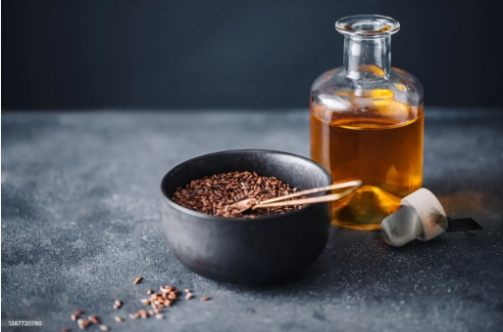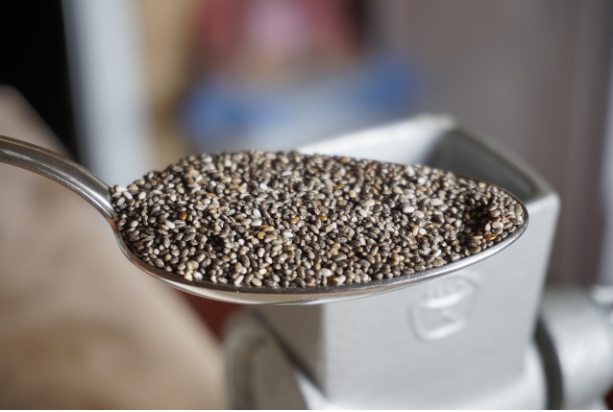The super food Flax seeds are loaded with different supplements and are frequently promoted for their potential medical advantages, especially for men. Here, we will study the flax seed benefits for males and the flax seed side effects for males, guaranteeing you a full understanding of what these seeds can mean for your general prosperity. Flax Seed Benefits for Male 1. Heart heath flax seed benefits for male consolidates their ability to help cardiovascular prosperity. Flax seeds are well off in omega-3 unsaturated fats, expressly alpha-linolenic corrosive (ALA), which has been shown to help with cutting down heartbeat, decrease the gamble of coronary ailment, and further foster cholesterol levels. 2. Prostate Health: One of the huge flax seed benefits for male is their capacity to help prostate prosperity. Flax seeds contain lignans, which are cell support increases that could help with reducing the bet of prostate sickness and innocuous prostatic hyperplasia (BPH), a commonplace condition that impacts more settled men. 3. Fertility and Testosterone: As per some examination flax seed benefits for male incorporate better richness and testosterone levels Flax seeds are a fair wellspring of omega-3 unsaturated fats and lignans, which could help in managing the coordinating compound balance and further foster sperm quality and motility. 4. Diabetes Management: Flax seed benefits for male with diabetes or those at risk for cultivating this condition. The high fiber in flax seeds benefits men by assisting with controlling glucose levels and further develops insulin responsiveness. 5. Weight Management: Adding flax seed benefits for male into your eating regimen can be a useful device for weight the executives. The fiber and protein in flax seeds can advance sensations of completion and satiety, making it simpler to keep a solid weight. Flax Seeds Side Effects for Male Digestive Issues: While there are various benefits, but possible flax seed side effects for male can also be possible. The most common is digestive discomfort, such as bloating, gas and diarrhea, mostly if you take large amounts of flax seeds or introduce them into your diet way too quickly. Interference with Medication: Flax seed side effects for male might incorporate communications with specific medications, like blood thinners, diabetes medications, and chemical treatments. It’s essential to converse with your clinical benefits provider before coordinating flax seeds into your eating routine, particularly if you are taking any specialist-endorsed drugs. Allergic Reactions: Although rare, a few people might encounter flax seeds secondary effects for male as hypersensitive responses, like hives, rashes, or respiratory hardships. Assuming you experience any unfavorable responses subsequent to consuming flax seeds, suspend use and look for clinical consideration. Kidney Stones: oxalate a compound found in flax seed in high quantity,which can add to the development of kidney stones. Men with a foundation set apart by kidney stones or those at risk for making them should be careful about consuming a ton of flax seeds benefits for male Hormone Imbalances: In some cases,the lignans in flax seeds might make a gentle estrogenic difference, which might actually prompt flax seeds secondary effects for male connected with chemical irregular characteristics, like changes in sexual capability or richness. It’s important to take note that the potential secondary effects of flax seeds for men are, for the most part, connected with the unnecessary or delayed utilization of flax seeds. Balance and progressive presentation in your eating routine can assist with limiting the risk of unfavorable impacts. Conclusion In conclusion, flax seed benefits are various and range from being effective on cardiovascular well being and prostate capability to better richness and diabetes the board. Be that as it may, it’s essential to know about the potential flax seeds side effects for male, like stomach related issues, drug connections, and kidney stone development, and to talk with a medical care proficient before fundamentally expanding your flax seed consumption. By understanding both the advantages and expected downsides, you can arrive at an educated conclusion about integrating these flexible seeds into your general well being and health routine. Written By:-Amisha
Category: Blog
Your blog category
5 health benefit of omega-3 on health
Omega-3 Fatty Acids It is one kind of polyunsaturated fat that is essential to preserving our general health and well being is omega-3 fatty acids. The reason certain nutrients are referred to be “essential” is that our bodies are unable to generate them naturally; instead, we must get them from our food or supplements. The advantages , the appropriate consumption, and the finest dietary sources to guarantee you are receiving enough of these vital nutrients are all covered in this article. The Benefits of Omega-3 Fatty Acids Omega-3 fatty acids have a wide range of health benefits that have been extensively studied and documented. Here are some of the key benefits: Heart Health Omega-3 fatty acids have been shown to have a positive impact on heart health. They can help lower triglyceride levels, reduce inflammation, and improve the function of the endothelium, which is the lining of the blood vessels. This can lead to a reduced risk of heart disease, stroke, and heart attack. Brain Health The growth and function of the brain depend on omega-3 fatty acids. They may help treat depression and other mental health issues, in addition to being crucial for preserving cognitive function and lowering the risk of dementia and Alzheimer’s disease. Inflammation Reduction They have potent anti-inflammatory properties, which can help reduce the risk of chronic diseases such as arthritis, autoimmune disorders, and certain types of cancer. Eye Health They are essential for the health of the eyes, and they may help reduce the risk of age-related macular degeneration, the leading cause of vision loss in older adults. Pregnancy and Child Development Omega-3 fatty acids are crucial for fetal development and growth, and they may also help reduce the risk of preterm birth and support the cognitive and visual development of infants and children. Recommended Intake and Food Sources The recommended intake of omega-3 fatty acids varies depending on age, gender, and health status. The general recommendation for adults is to consume between 1.1 and 1.6 grams of omega-3 fatty acids per day, with a focus on EPA (eicosapentaenoic acid) and DHA (docosahexaenoic acid). The best food sources of omega-3 fatty acids include: There are different ways of getting that omega 3 from your food. Some veg sources and some non-veg Fatty Fish Fatty fish, such as salmon, mackerel, sardines, and tuna, are some of the best sources of omega-3 fatty acids. Consuming these fish two to three times a week can help you meet your recommended intake. Nuts and Seeds Walnuts, flax seeds, chia seeds, and hemp seeds are all good sources of omega-3 fatty acids, particularly the ALA (alpha-linolenic acid) form. Plant Oils Certain plant-based oils, such as flax seed oil, canola oil, and walnut oil, are also rich in omega-3 fatty acids. The Importance of Omega-3 Fatty Acids They are essential for maintaining overall health and well-being, and their importance cannot be overstated. From heart health to brain function, inflammation reduction, and eye health, these nutrients play a vital role in our bodies. Given the numerous health benefits, it is important to ensure that you are getting enough of these nutrients in your diet. If you are unable to meet your recommended intake through diet alone, supplementation may be necessary. However, it is always best to consult with a healthcare professional before starting any new supplement regimen. Conclusion One doesn’t need to emphasize enough the importance this fatty acid as a constituent of a nutritious diet. Knowing the advantages of these vital nutrients, together with the ideal sources in your diet and suggested consumption, can help you make sure you are consuming enough omega-3 fatty acids to maintain your overall well-being and health. Written By:- Amisha
Keto Diet: A Comprehensive Guide
What is the Keto Diet? The ketogenic diet, is a high-fat, low-carbohydrate dietary approach that has gained significant popularity in recent years. It aims to put the body into a metabolic state called ketosis, where the body begins to burn fat for fuel instead of carbohydrates. In a traditional diet, the body primarily uses glucose, derived from carbohydrates, as its main source of energy. This diet, on the other hand, drastically reduces carbohydrate intake, typically to less than 50 grams per day, forcing the body to transition to an alternative fuel source – ketones. Ketones are produced when the body breaks down fat for energy, and they can be used by the brain and other organs as a source of fuel. This metabolic shift can have various health benefits, including weight loss, improved insulin sensitivity, and reduced inflammation. Benefits of the Keto Diet 1. Weight Loss: The diet is known for its ability to promote weight loss. By restricting carbohydrates and increasing fat intake, the body enters a state of ketosis, which can lead to a higher rate of fat burning and reduced appetite. 2. Improved Insulin Sensitivity: This diet has been shown to improve insulin sensitivity, which is crucial for managing blood sugar levels and reducing the risk of type 2 diabetes. 3.Reduced Inflammation: The high-fat, low-carb nature of the diet can help decrease inflammation in the body, which is linked to various health conditions, such as heart disease, cancer, and Alzheimer’s disease. 4.Improved Brain Function: Ketones can provide an alternative fuel source for the brain, which may lead to improved cognitive function, focus, and mental clarity. 5. Epilepsy Management: This diet has been used successfully to manage epilepsy, particularly in children, by reducing the frequency and severity of seizures. What to Do on the Keto Diet Focus on High-Fat Foods: This diet emphasizes consuming high-fat foods, such as avocados, nuts, seeds, olive oil, and fatty cuts of meat. Limit Carbohydrate Intake: To achieve and maintain ketosis, it’s essential to limit carbohydrate intake to less than 50 grams per day. This means focusing on low-carb vegetables, berries, and other non-starchy foods. Increase Protein Intake: While the diet is high in fat, it’s also important to consume an adequate amount of protein to support muscle mass and overall health. Stay Hydrated: Drinking plenty of water is crucial while following this diet, as the body may lose more fluid and electrolytes during the initial stages of the diet. Monitor Ketone Levels: To ensure that you’re in a state of ketosis, you can use urine, blood, or breath tests to monitor your ketone levels. What to Avoid on the Keto Diet High-Carb Foods: Steer clear of high-carb foods, such as bread, pasta, rice, potatoes, and sugary treats, as these can disrupt ketosis. Processed Foods: Avoid processed and packaged foods, as they often contain hidden carbohydrates and preservatives that can hinder your progress on the diet. Alcohol: Alcohol can be high in carbohydrates and may slow down the process of achieving and maintaining ketosis. Legumes: While some legumes, such as chickpeas and lentils, can be included in moderation, they are generally higher in carbohydrates and should be limited. Certain Vegetables: Some vegetables, such as carrots, beets, and corn, are higher in carbohydrates and should be consumed in moderation while following this diet. Conclusion This diet is a powerful dietary approach that can provide a range of health benefits, from weight loss to improved brain function. By understanding the principles and following the recommended guidelines, individuals can potentially experience transformation results. However, it’s important to remember that it may not be suitable for everyone, and it’s always best to consult with a healthcare professional before starting any new dietary regime. With the right approach and commitment, it can be a highly effective tool in achieving one’s health and wellness goals.Remember, this diet is a highly individualized approach, and it’s important to consult with a healthcare professional before starting any new diet or making significant changes to your eating habits. Written By:- Amisha
Chia seed : 9 powerful health benefits
CHIA SEED Chia seeds are a superfood rich in nutrients and full of health-promoting ingredients. They are a great source of essential minerals, plant-based protein, omega-3 fatty acids, and dietary fibre. Owing to its remarkable nutritional composition and adaptability in the kitchen, chia seeds have gained popularity as a healthy food option. Benefit of chia seed An outline of chia seeds’ possible health advantages is provided below: 1. Nutritional Profile Nutrient-dense chia seeds are high in fibre, protein, antioxidants, omega-3 fatty acids, and a host of other vitamins and minerals. They are very rich in fibre; one ounce (28 gms) has around 11 gms of fibre, or more than one-third of the daily recommended amount. 2. Omega 3 fatty acid One of the greatest plant-based sources of the necessary fatty acid omega-3 alpha-linolenic acid (ALA) is chia seeds. ALA is critical for brain function, heart health, and inflammation reduction. 3. Blood sugar control The fibre and protein included in them may aid to regulate blood sugar levels by slowing down the absorption of carbohydrates. Some study suggests that they may help improve insulin sensitivity and reduce the risk of type 2 diabetes. 4. Heart Health They include omega-3 fatty acids, fibre, and antioxidants that may help reduce blood pressure, inflammation, and cholesterol—all of which are heart disease risk factors. 5. Weight management It has a high fibre and protein content that may help with weight reduction or maintenance by promoting feelings of fullness and satisfaction. According to certain studies, it may also aid in the reduction of belly fat. 6. Digestive health It contain soluble fibre, which can aid in controlling bowel motions and enhancing digestive health in general. Additionally, the fibre could nourish the good bacteria in your stomach, which is crucial for gut health. 7. Bone health It are a good source of nutrients, such as calcium and magnesium, which are necessary for strong and healthy bones. How to use chia seed on daily basis Here are some different ways to use chia seeds: 1. Sprinkle them on top of salads, yogurt, oatmeal, cereal, or smoothies for a nutritional boost. Chia seeds are high in fiber, protein, omega-3s, and other nutrients. 2. Make a chia seed pudding by soaking the seeds in plant-based milk, fruit juice, or water along with your choice of sweetener, fruits, nuts, etc. 3. Add to baked goods like muffins, breads, cookies, and granola bars. They add texture and nutrition. 4. Use it to make a healthy, vegan egg substitute. Mix 1 tablespoon with 3 tablespoons of water and let it sit for a few minutes until it forms a gel-like consistency. 5. Make jam by cooking down fruit with chia seeds. The seeds will thicken the jam without the need for sugar or pectin. 6. Sprinkle on top of avocado toast or hummus for a crunchy topping. 7. Mix into batters for pancakes, waffles, or crepes to add fiber and nutrients. 8. Add to homemade energy bars, balls, or bites for an extra nutritional punch. 9. Use to thicken smoothies, soups, or sauces. Just a tablespoon or two can make a difference. 10. Incorporate into homemade granola or trail mixes. The versatility of chia seeds makes them a great addition to both sweet and savory dishes. Start with small amounts and experiment to find your favorite ways to use them. Conclusion To sum up, they are beneficial to general health. Furthermore, offer significant amounts of essential minerals including calcium, magnesium, and phosphorus in addition to high-quality plant-based protein. Antioxidants found in the seeds may also aid in lowering inflammation and defending against oxidative stress. It’s not surprising that chia seeds have gained popularity as a health food option for individuals trying to increase their nutrient intake and promote general well-being, given its remarkable nutritional profile and adaptability in baking and cooking. Written By:- Amisha





